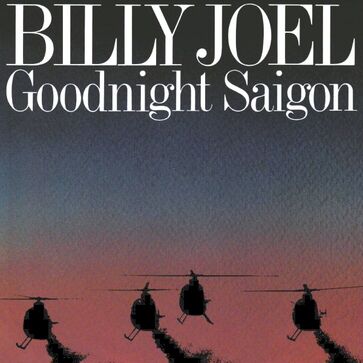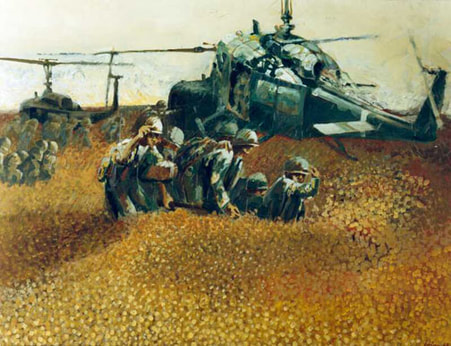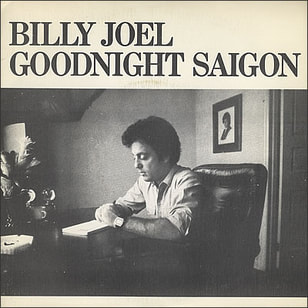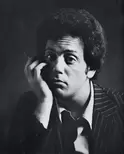|
Goodnight Saigon
The Nylon Curtain (1982) |
|
Remember Charlie, remember Baker
They left their childhood on every acre And who was wrong? And who was right? It didn't matter in the thick of the fight "Goodnight Saigon" is Billy's epic about the Vietnam War experience. Although one might consider it a political song, it is actually a personal, intimate song, about the people who fought in the war and the camaraderie and tragedy they shared. It is in essence a simple folk song, despite the helicopter-sound introduction and Billy's "knives, knives, knives" wail, which detracts from the song in my opinion. Some have labeled it as bombastic and overdone, but it is mostly a quiet song, and the chorus "we would all go down together" is appropriately anthemic, not bombastic.
This is one of the best songs about the Vietnam War experience. The references to the small things in life such as "soft soap" and "our Doors tapes" accurately depicts the small reminders of home life that sustained the troops. And Billy captures the brotherhood and sisterhood of the soldiers in the powerful refrain "and we would all go down together." The song begins with the sound of crickets chirping and wind chimes at night, giving a sense of calm. But this calm gradually gives way to the ominous whir of approaching helicopters signaling an imminent battle. At the end of the song, after the battle has been fought, this sequence is reversed as the helicopters leave (carrying away the wounded and dead), and the crickets and wind chimes return. It is quite moving and evocative. The last verse also accurately describe the anxiety and uncertainty of the war, as the unseen enemy "ruled the nights" and "counted the rotors, and waited for us to arrive." But the song does not go on to describe the actual battle, rather it returns to the refrain "we would all go down together," emphasizing the bond between the soldiers rather than the battle. Musically, Billy said he was inspired by the structure and arrangement of The Beatles "A Day In The Life" (YouTube link) from the seminal album Sgt. Pepper's Lonely Hearts Club Band. As in that song, the verses are spare, accompanied mainly by an acoustic guitar, but the choruses are more grand and lush like a large symphony is playing. Billy discusses the influence of "A Day In The Life" on "Goodnight Saigon" in the audio clip (right). |
We met as soulmates on Parris Island
We left as inmates from an asylum And we were sharp, as sharp as knives And we were so gung ho to lay down our lives We came in spastic like tameless horses We left in plastic as numbered corpses And we learned fast to travel light Our arms were heavy but our bellies were tight We had no home front, we had no soft soap They sent us Playboy, they gave us Bob Hope We dug in deep and shot on sight And prayed to Jesus Christ with all of our might We had no cameras to shoot the landscape We passed the hash pipe and played our Doors tapes And it was dark, so dark at night And we held on to each other Like brother to brother We promised our mothers we'd write And we would all go down together We said we'd all go down together Yes we would all go down together Remember Charlie, remember Baker They left their childhood on every acre And who was wrong? And who was right? It didn't matter in the thick of the fight We held the day in the palm of our hands They ruled the night, and the night Seemed to last as long as six weeks On Parris Island We held the coastline, they held the highlands And they were sharp, as sharp as knives They heard the hum of our motors They counted the rotors And waited for us to arrive And we would all go down together We said we'd all go down together Yes we would all go down together Chopper Pick-Up, Brian H. Clark (1968).
"And we would all go down together . . . ." Billy on "Goodnight Saigon" from a 1982 interview with Ed Sciaky.
Billy on "Goodnight Saigon" from a 1982 interview in the UK.
Billy on "Goodnight Saigon" from an interview with Dan Neer.
Billy on "Goodnight Saigon" from SiriusXM in or about 2016.
Vertical Divider
|
|
Although Billy himself did not serve in the armed forces, his friends and crew members did and urged him to write the song. As he has said, one of the best books about the Civil War, The Red Badge of Courage, was written by Stephen Crane who was not a soldier. ''Of course I was hesitant to write about Vietnam, because I wasn't there,'' Billy said. ''But a lot of my friends fought in Vietnam and two close friends were killed. But the people I knew who fought and came back encouraged me to write it. I picked their brains and asked them what music they listened to, what they did, and how they felt. The feeling of camaraderie, of only having one another for support, was something they all still share.'' (From The New York Times, S. Holden). As a chronicler of the Baby Boom generation, Billy penned the penultimate pop song about the most important event of his generation.
|
* * * * * * * * * * * * *
Iconic folk singer Joan Baez, a vocal anti-war figure in the 1960s, does a fine cover version of the song (YouTube audio). Garth Brooks has also performed the song live in concert, including at the Kennedy Center Honors program honoring Billy. Billy does a great version on the Last Play at Shea Stadium, he is joined in concert by veterans. The song was also used in a satirical skit on Saturday Night Live in 2009 sung by an all-star cast led by Will Ferrell. Professor Morgan Jones, wrote a law review article about the song, published in 2016 in the Touro University Law Review. He notes that the critic Stephen Holden called the song the “ultimate epitaph” to the Vietnam War.
About twenty-five years after "Goodnight, Saigon" was released, Billy would write another song about war from the soldier's perspective, "Christmas In Fallujah" (YouTube link) which was recorded by Cass Dillon. Billy didn't record it himself as he thought it should be sung by a younger man since soldiers are typically young men or women.
About twenty-five years after "Goodnight, Saigon" was released, Billy would write another song about war from the soldier's perspective, "Christmas In Fallujah" (YouTube link) which was recorded by Cass Dillon. Billy didn't record it himself as he thought it should be sung by a younger man since soldiers are typically young men or women.
Background photo: Source unknown.






